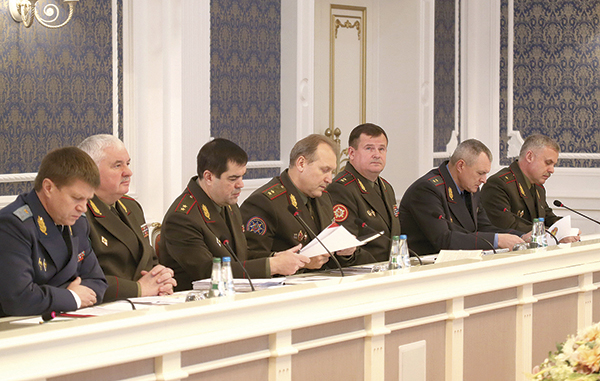At a recent session, Alexander Lukashenko stressed that it’s essential to make a comprehensive assessment of our national security, with particular reference to its ability to respond promptly to threats. It’s also vital to find out if law enforcement bodies are prepared for various scenarios, and if they can forecast and forestall negative consequences.

During the session
In this context, all agencies must be effective in coping with existing tasks and have well-developed strategies of operation. The President has urged all agencies to prepare long-term and short-term plans.
The President also focused on the need to optimise resources, to ensure the smooth operation of law enforcement bodies. “We can’t afford to maintain more law enforcement staff than are necessary but nor should we oversimplify the system, rendering it inefficient,” warns Mr. Lukashenko.
Addressing the participants of the session, Mr. Lukashenko noted his desire to see them take a fresh look at their agencies’ operation, in search of more cost-effective methods, while maintaining results. He asserted, “We need to eradicate excessive and, sometimes, artificial functions, including those which are supervisory, preventing the duplication of various agencies’ functions. We’ll control and place in check enterprises of all types of ownership if they violate the law. However, we need to have a clear idea of the situation. Inspections should be conducted objectively. I’ll pay special attention to this.”
Mr. Lukashenko believes it to be inadmissible for auditors to visit enterprises one after another, creating obstacles rather than working to improve the situation in the economy.
The President asked the officials at the meeting if they are ready to lead their agencies in these times of rapid change. He noted, “At the end of the session, we need to determine paths of development for the country’s law enforcement system, and to reconsider not only general tasks assigned to that system but to each national security agency in particular.”
Following the recent Presidential elections, the Belarusian Government has been retired, allowing the Head of State to appoint his new ministers, seeking out those who have proven not only their competence but their willingness to work appropriately.
The composition of the new Government was suggested before the elections, so that voters might know whom was intended to work with Mr. Lukashenko. He underlined, “I don’t sign appointment decrees as a mere formality. Every executive will have to present their vision to the subordinate Government agency. Suggestions in favour of real reform and, even, radical remodelling, as well as step-by-step advancement, are welcome. We’ve already implemented rather profound reforms.”
Chatting to journalists after the session, the State Secretary of the Security Council, Stanislav Zas, specified that national security must work through rationalised, mobile and highly-efficient law enforcement bodies and other power structures.
“The Head of State has made clear that it isn’t possible to work as in the past. Heads need to adjust their attitude and the work of their subordinated departments,” he noted.
The Security Council is tasked to control executive discipline across all power structures.
By Vladimir Khromov












